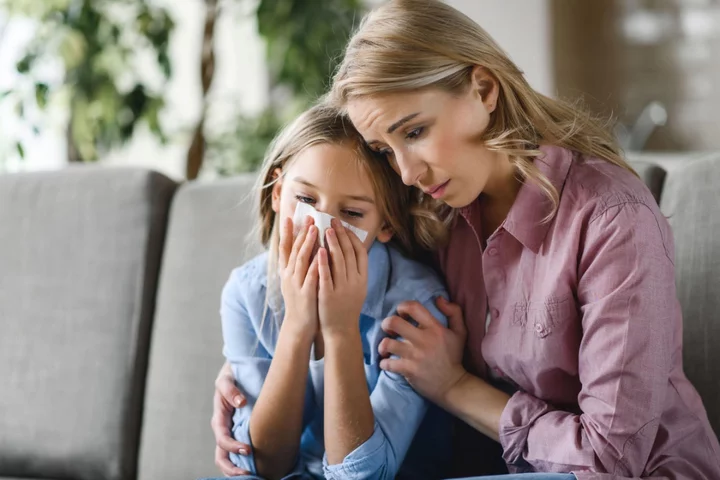
Woman escapes alleged kidnapper posing as an Uber driver by passing secret note to gas station customer
An Arizona woman who was allegedly kidnapped by a man in a wig posing as an Uber driver escaped after passing a note to a gas station customer pleading for help, according to authorities. The woman was abducted from a car dealership in Phoenix at 7am on Monday, the Yavapai County Sheriff’s Office (YCSO) said in a statement. The suspect, identified by authorities as 41-year-old Jacob Wilhoit, “restrained” the woman in the car and drove north towards Las Vegas, and they spent the night in a Lake Mead park, the sheriff’s office said. At 5pm on Tuesday, they pulled into a Chevron gas station 150 miles southeast in Seligman, Arizona. The woman signalled to another customer and passed a note with a description of her abductor and his blue Honda van, and begged them to call 911. “Help,” the note read. “Call 911.” The note included a a phone number and that they were headed to “Kingman Las Vegas”. Their van was intercepted by officers from the Department of Public Safety (DPS) heading westbound on the I-40, and Mr Wilhoit was detained without incident, according to authorities. Several firearms were found “in plain view” in his car, they said. Deputies also learned the woman had been reported missing by her mother the previous day, who named Mr Wilhoit as a “person of interest”. Mr Wilhoit has been arrested on charges including aggravated assault, unlawful imprisonment, kidnapping, and other assault and harassment charges. “The victim’s extraordinary action in passing the note, the customer’s willingness to assist, and the quick actions of YCSO and DPS saved the victim from her kidnapper and allowed her to return home with her family,” Yavapai County Sheriff’s Office said. Read More The BTK killer’s need for notoriety led to his capture a decade ago. He’s now a ‘prime suspect’ in at least two other murders Ambushed at an LA park, kidnapped and her body dumped in a field: What happened to Andrea Vazquez? California woman who vanished eight years ago reappears to ask police to take her off missing persons list
2023-08-25 22:52

Five family members found dead inside Ohio home
Five family members have been found dead in a home in northeast Ohio in an apparent murder-suicide, authorities say. Police in Uniontown, Stark County, made the grisly discovery after performing a wellbeing check at a home in the 13000 block of Carnation Avenue around 7.30pm on Thursday. Officers found five dead family members, and described the incident as a domestic dispute that “turned deadly”. The victims were identified as Jason Dunham, 46, Melissa Dunham, 42, Renee Dunham, 15, Amber Dunham, 12, and 9-year-old Evan Dunham. The Stark County Sheriff’s Office, Ohio Bureau of Criminal Investigation and the Stark County Prosecutor’s Office are helping Uniontown police with the investigation. Uniontown is a town of approximately 7,000 residents, situated 50 miles south of Cleveland. Read More GOP support for gun restrictions slips a year after Congress passed firearms law Philadelphia officer to be fired over shooting death of Black man as new video contradicts police account Donald Trump’s weight and height in Georgia arrest records raises eyebrows
2023-08-25 22:47

This is how stress affects different parts of the body
The increased focus on mental health in the last few years has seen more and more people turning to things like mindfulness, meditation and talking therapies to cope with stress. While these techniques can be very effective, it’s important to remember that stress isn’t ‘all in your head’ – it can have a serious physical impact as well. “Stress is how you feel and respond when life puts you under a lot of pressure,” says Dr Luke Powles, associate clinical director at Bupa Health Clinics. “A certain amount of stress can be positive, as it can help you prepare for challenges and respond to them,” Powles adds. “But too much stress, especially over a long period of time, can cause both mental and physical problems.” That’s why it’s vital to look at the sources of stress in your life and be aware of both the short and long-term symptoms. Here’s how stress can affect different parts of the body… Heart and lungs A sudden surge of stress can make you feel like you’ve just run up several flights of stairs. “Immediately, you’re going to get an increase in your heart rate, with that almost panic attack or anxiety-like feeling,” says Dr Alka Patel, aka the Health Hacktivation Doctor. “Your breathing rate is going to speed up as well, because you’re trying to oxygenate your blood.” That’s also why you might get sweaty palms or pits: “You get vasodilatation of your blood vessels – you’re basically trying to increase blood flow to your body, so sweating is a very immediate phenomenon for most people.” Stressful situations can raise your blood pressure temporarily too, Powell says: “If you’re stressed over a long time, you could possibly develop long-term high blood pressure.” The link between stress and heart disease is mitigated by other factors. “Stress may not directly cause coronary heart disease, such as a heart attack or stroke and cholesterol,” says Powell. “But if you smoke, drink, or eat more to cope with stress, you increase your risk of these. Stress may also increase the risk of type 2 diabetes.” Doctors also warn about heart rate variability (HRV), meaning the variation in the pauses between heartbeats. “You want a high HRV because you want to be adaptable,” Patel explains. “When you’re under chronic stress your HRV starts to drop, and that tells you that you’re not resilient in the face of stress.” Stomach and gut Feeling too anxious to eat? Or craving carbs when you’re under pressure? “You’re releasing this surge of cortisol, the stress hormone, very quickly, which is then trying to get as much sugar and fuel on board,” Patel explains. “A lot of people will then either notice the hunger response: ‘I’ve got to eat lunch to manage my stress’. Or you notice the dip, which is: ‘I don’t want to eat, I can’t eat anything else’.” You might experience digestive issues as well, she continues: “With an immediate stress reaction, everything else in your body has to stop. This means you can start to get those symptoms of diarrhoea, upset stomach, that kind of thing, because all of those digestive processes have to have to halt in order to manage your stress.” There are also some links between chronic stress and certain illnesses, including digestive complaints. “If you have a pre-existing health condition, stress could make it worse, or flare up,” says Powell. “Examples of conditions that can be aggravated by stress include irritable bowel syndrome, eczema, asthma and psoriasis.” Muscles A surge of stress can cause muscle spasms called fasciculation and tension in the cervical muscles of the neck, which might lead to a headache. “People don’t necessarily associate headaches with muscles, but you can get spasms in your upper neck muscles and shoulders,” Patel says. “You feel the tension in the muscles going over your scalp – and that’s why we call these tension headaches.” Teeth and mouth Stress can also harm your oral health, which should be dealt with by a dentist. “Teeth grinding (bruxism) is often linked to stress, but lots of people aren’t aware they have the condition because it happens in their sleep,” says Powell. “Symptoms include headaches, earache, stiffness and pain in the jaw or mouth; teeth which are breaking or look worn down; and facial swelling.” Inflammageing A hot topic among longevity specialists in recent years, ‘inflammageing’ means chronic inflammation that has a damaging effect and is caused by a variety of diet and lifestyle factors. “Stress accelerates ageing, and then there’s a whole cascade of stuff that goes on as a result of that,” says Patel. “[It affects] your immune response, the communication between your cells, muscle function and your bones.”
2023-08-25 21:28

Australian council votes to take down statue of premier who decapitated Aboriginal man's body
A city council in Australia has voted to remove a statue of William Crowther, a former premier of the state of Tasmania, who decapitated the body of an Aboriginal man.
2023-08-25 19:53

Irish students receive boosted Leaving Cert results for third year running
Unlike in the UK, grades were still boosted to reduce the effects of the Covid-19 pandemic.
2023-08-25 19:19

Virgin Galactic: Student Ana Mayers on going to space with her mum
Two weeks after she was in space with her mum, Ana Mayers is going back to university in Scotland.
2023-08-25 18:53

Trump's Georgia mugshot quickly becomes a campaign symbol
Within minutes of it being released, it appeared on his website along with a call for campaign donations.
2023-08-25 17:16

4 hacks to get teens off the sofa and get active – as study warns of heart damage
The amount of screen time teenagers get is a worry to lots of parents. And, it turns out, the health impacts of being inside and staring at a screen for long periods of time can have a serious impact on a young person’s physical health later in life. According to new research, parents should limit the amount of time children spend on social media and video games after a study found inactive teenagers are more likely to have signs of heart damage as young adults. A child may appear healthy but, even children who have a normal weight were still at risk, the study of 766 British youngsters found, after tracking them for 13 years. Academics involved in the research, which is to be published at the ESC Congress in Amsterdam, said that this heart damage could be setting the stage for heart attacks and strokes in later life. So, how can we get teens up, away from their phones and out of the house? 1. Encourage them to destress Teens may take to their screens to distract themselves from day-to-day life, watch TikToks, or aimlessly scroll – which they may see this as a form of relaxation. It might be helpful to frame exercise in the same way for stressed teens. “Young people today are facing many stress factors in their daily lives and exercise can be an important mechanism to cope and overcome such difficulties,” says Dr Triveni Joshi, consultant child and adolescent psychiatrist for Cygnet Health Care. Reiterate the benefits of exercise for their mental wellbeing too. “When you exercise, your body produces dopamine and endorphins in your brain that help you to feel good. Exercise can have a direct impact on improving mental health by reducing anxiety, depression and low mood,” she says. “Plus, exercise can give you a real sense of accomplishment and pride at having achieved a goal, thereby improving self-esteem and confidence.” Celebrate the accomplishment of just getting out and being healthy for positive reinforcement. 2. Suggest things that interest them “There is always an activity that can suit somebody,” says Joshi.”There is a range of opportunities for physical activity such as gardening, walking groups, Zumba, dancing, pilates, or swimming.” Sports like weightlifting and running are big on social media and “can improve confidence levels and tackle low self-esteem.” While being on social media may stop them from getting out, pointing towards creators who promote a healthier lifestyle may help them in the long run. Perhaps they can pair their on-screen interests and favourite creators with physical experiences. “Exercise should always be fun so often it is about finding where their interests lie and incorporating that into a healthy regime,” Joshi explains. 3. Talk to them about why they don’t want to exercise There may be a reason why your teen isn’t eager to get up and about you don’t know about, and having an open discussion may help them feel more comfortable, and build a closer bond with you. “With other pressures in their lives they may feel tired and lack the motivation to get active,” Joshi says. “A lot can depend on personality type too. Introverted children may feel shy, embarrassed, or too concerned about judgements to take part in physical activity. It might not pique their interest or they may feel it is something they aren’t skilful at and therefore don’t have the motivation for fear of not being good at something.” Getting to the bottom of why they won’t exercise may help them feel more empowered to do so, particularly if you can relate to one another and take on this challenge together. 4. Set a good example So much of our relationship with exercise is rooted in our childhood, so try to “encourage children to be active by setting the right example and being active yourself”, says Joshi. If you complain about exercise and are on your screen all the time, it sends the message that it’s normal. In trying to set a good example, you may find something you love to do together, like a specific yoga class, workout or weekly ParkRun. Read More Former royal chef explains why Prince William and Kate’s children don’t eat with them ‘You think it’s going to be a money making machine’: How modern life killed the hobby High infidelity: why do people have affairs? Why are wellbeing experts concerned about the ‘lazy girl job’ trend? Almost half of parents have ‘no idea’ how people raised children before smartphones ‘Overwhelmed’ Jennifer Lopez celebrates one-year anniversary to Ben Affleck
2023-08-25 16:29

Woman accused of abandoning her dog at airport to go on holiday to Mexico
A woman has been charged with animal cruelty for allegedly abandoning her dog at a Pennsylvania airport before boarding a flight to a resort in Mexico. Allison Gaiser, 44, allegedly ditched her brown-and-white male French bulldog at Pittsburgh International Airport on 4 August after she was denied boarding by the airline because it did not meet the criteria for an emotional support animal, the Allegheny county police said on Thursday. She also did not have a proper kennel required to bring the animal onto a flight, the authorities said. After leaving the ticket counter, Ms Gaiser was seen on surveillance cameras pushing the dog in the stroller back toward a moving walkway enclosure, next to glass exit doors in the airport's short-term parking lot. She later moved to an area where a county police officer found the dog unattended in the stroller about 40 minutes later at around 5.03am, authorities said. The dog, which was licensed and had an identification microchip, was found unharmed and turned over to an animal care facility. He was later sent to a foster home and is doing well, the police said. Authorities were waiting for Ms Gaiser when she returned to the airport about 12.30am on 10 August. She admitted leaving the dog behind because the airline wouldn't allow it on the plane but claimed to have made arrangements with her mother to pick up the animal at the airport, according to the Associated Press. She allowed the police to review text messages between her and her mother, but authorities said it was apparent that no immediate arrangement was made for Ms Gaiser's mother to pick up the dog. The mother said she only found out about the incident when Ms Gaiser's ex-husband shared a news story about the dog being left at the airport. Ms Gaiser has been charged with one misdemeanor count of animal cruelty, summary violations of animal cruelty, animal neglect and abandonment of animals by owner. Her initial court hearing is scheduled for 16 October. "There are many pets still looking for a home, and we would encourage anyone interested in adoption to reach out to Animal Friends at 412-847-7000," the police department said on Facebook. Read More Dog owner documents rescued maltese’s ‘journey to walking again’ after she was suddenly paralysed Dogs being killed, poisoned, beaten and mutilated on massive scale, says RSPCA Britney Spears called out by PETA over her alleged decision to buy new puppy instead of rescue
2023-08-25 16:16

Praggnanandhaa: India chess prodigy's 'remarkable' impact on the sport
R Praggnanandhaa lost the World Cup, but experts say he remains an inspirational figure in Indian chess.
2023-08-25 15:55

How to protect your kids and yourself from back-to-school colds
While your child may be excited about returning to school this September, there’s also a little anxiety about the one thing that can put a spanner in the works: a cold. As Dr Dave Nichols, of MyHealthChecked, an at-home wellness testing company, puts it: “The return to school following the summer holidays often coincides with a rise in a number of respiratory illnesses, including the common cold.” Common symptoms include a cough, sore throat, nasal irritation, nasal discharge (rhinorrhoea), a fever or generalised malaise, explains Nichols. “While the common cold can affect all population groups, the National Institute for Health and Care Excellence report this to be far higher amongst children, who experience an average of five to eight colds per year.” Nichols continues: “Adults who have regular contact with children are also seen to have colds more frequently.” He says children are especially important in the transmission, acting as reservoirs for the infection as they have fewer antibodies and a more immature immune system, making them more susceptible to the common cold. “Direct contact with the skin or hand contact with an infected object are key ways the virus is transmitted,” notes Nichols. “Which explains why numbers seen amongst children are higher, as they are more likely to have close contact with each other in nursery and school.” While there is no cure for the common cold, he says prevention remains crucial in order to protect ourselves from illness. Here are some top tips to reduce the chances of catching a cold… Adopt good hygiene measures Basic good hygiene measures are an important way of reducing the transmission of viruses, says Nichols. Wash hands frequently with warm soap and water if you (or the kids) have symptoms, or have come into close contact with someone who has symptoms. He says to avoid sharing items within households, such as towels, can also help. Get into a physical exercise routine Ensuring regular physical exercise is important because it has been shown to reduce the chances of people developing viral illnesses such as the common cold, advises Nichols. “Exercise plays an important role in boosting immunity by increasing the circulation of some important immune cells, which fight against infection,” says Nichols. “It also plays a key role in helping to reduce stress and the release of stress-related hormones within the body, which has an important impact.” Eat healthy foods to maximise your wellbeing “Eating well will help support a good functioning immune system,” says Dr Emeka Okorocha, medical doctor and TV personality. “The body needs a range of nutrients and vitamins to stay strong and healthy, and prevent the development of disease.” He highlights the following vitamins… “Vitamin A, which is converted from beta carotene found in vegetables such as sweet potatoes and beetroots, is very good for helping support the mucosal lining in your nose and lungs – and helps defend against infection. “Vitamin C has always been considered a good preventative vitamin from catching colds, this can be found naturally in fruits like strawberries, blueberries, blackberries and raspberries – and in leafy vegetables like spinach as well as broccoli, peppers and peas. “Vitamin D that many of us get from natural sunlight is also ideal for overall health – and studies have shown that people lacking in vitamin D are more likely to succumb to infection.” In winter months, when there are lower levels of natural sunlight, he says you can obtain vitamin D from foods such as salmon, mackerel, eggs, and mushrooms. Berries are very beneficial Okorocha continues: “I love fresh berries – strawberries, raspberries and blueberries, for example, are high in antioxidants and contain lots of vitamin C, which helps our bodies to produce antibodies that keep us from getting sick. “Berries are also high in flavonoids which help protect cells in our immune system by promoting activation and secretory processes within cells.” He says studies have indicated that regularly eating fruits such as blueberries may decrease your likelihood of catching a cold. Get adequate rest and sleep Ensuring you’re getting adequate amounts of rest and sleep is crucial in helping to reduce your risk of becoming unwell, urges Nichols. “A healthy adult needs between seven to nine hours of sleep per night, with children requiring longer,” says Nichols. “Sleep quality has been shown to be an important predictor of immunity, with those regularly sleeping under the recommended amounts more likely to develop a cold. “Improving your sleeping pattern is therefore an important way to reduce the chances of becoming unwell.” Read More Former royal chef explains why Prince William and Kate’s children don’t eat with them ‘You think it’s going to be a money making machine’: How modern life killed the hobby People defend bride after father-in-law explains why he left wedding early 4 hacks to get teens off the sofa and get active – as study warns of heart damage Elle King opens up about her ‘deep depression’ amid two-year postpartum journey BBC Radio 2’s Tony Blackburn reveals he had sepsis and pneumonia in health update
2023-08-25 15:52

Ukraine Recap: Biden, Zelenskiy Talk a Day After Prigozhin Death
US President Joe Biden and Ukraine’s President Volodymyr Zelenskiy on Thursday discussed the training of Ukrainian fighter pilots,
2023-08-25 15:50
